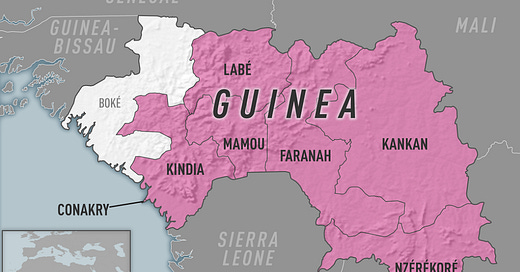An outbreak of the vaccine-preventable disease, diphtheria, affecting seven of the administrative regions in Guinea in western Africa has prompted a travel notice from the Centers for Disease Control and Prevention (CDC).
Since the beginning of the year through March 4, 1,218 total diphtheria cases and 11 deaths have been reported.
This is a protracted outbreak that began in July 2023. Last year, Guinea health officials reported 2,676 total cases and 91 deaths.
CDC warns travelers to Guinea vaccination against diphtheria is essential to protect against disease. If you are traveling to an affected area, you should be up to date with your diphtheria vaccines. Before travel, discuss the need for a booster dose with your healthcare professional.
In addition, health officials recommend the following:
Avoid contact with persons with symptoms of diphtheria, such as fever, sore throat, difficulty swallowing, change in voice, shortness of breath, weakness, or fatigue.
Avoid touching the wounds of others.
Cover your nose and mouth with a tissue when you cough or sneeze.
Wash your hands often with soap and water.
Diphtheria is a serious infection caused by strains of Corynebacterium diphtheriae bacteria that make a toxin. The toxin can cause people to get very sick. Diphtheria bacteria spread from person to person through respiratory droplets, like from coughing or sneezing. People can also get sick from touching open sores or ulcers of people sick with diphtheria.
When the bacteria get into the respiratory system they can cause sore throat, mild fever, and swollen glands in the neck. The bacteria make a toxin that kills healthy tissues in the respiratory system and can make it difficult to breathe and swallow. The toxin can also cause heart, nerve, and kidney problems if it enters the bloodstream. Skin infections caused by C. diphtheriae typically consist of shallow ulcers (sores) and do not result in severe disease.
For some people, respiratory diphtheria can lead to death. Even with treatment, about 1 in 10 patients with respiratory diphtheria die. Without treatment, up to half of patients can die from the disease.
If you are unvaccinated or not fully vaccinated against diphtheria and may have been exposed, it is important to start treatment as soon as possible.
All travelers 2 months and older traveling to outbreak areas should receive an age-appropriate dose of a diphtheria toxoid-containing vaccine if they are not fully vaccinated or if they have not received a booster dose within 5 years prior to departure.





